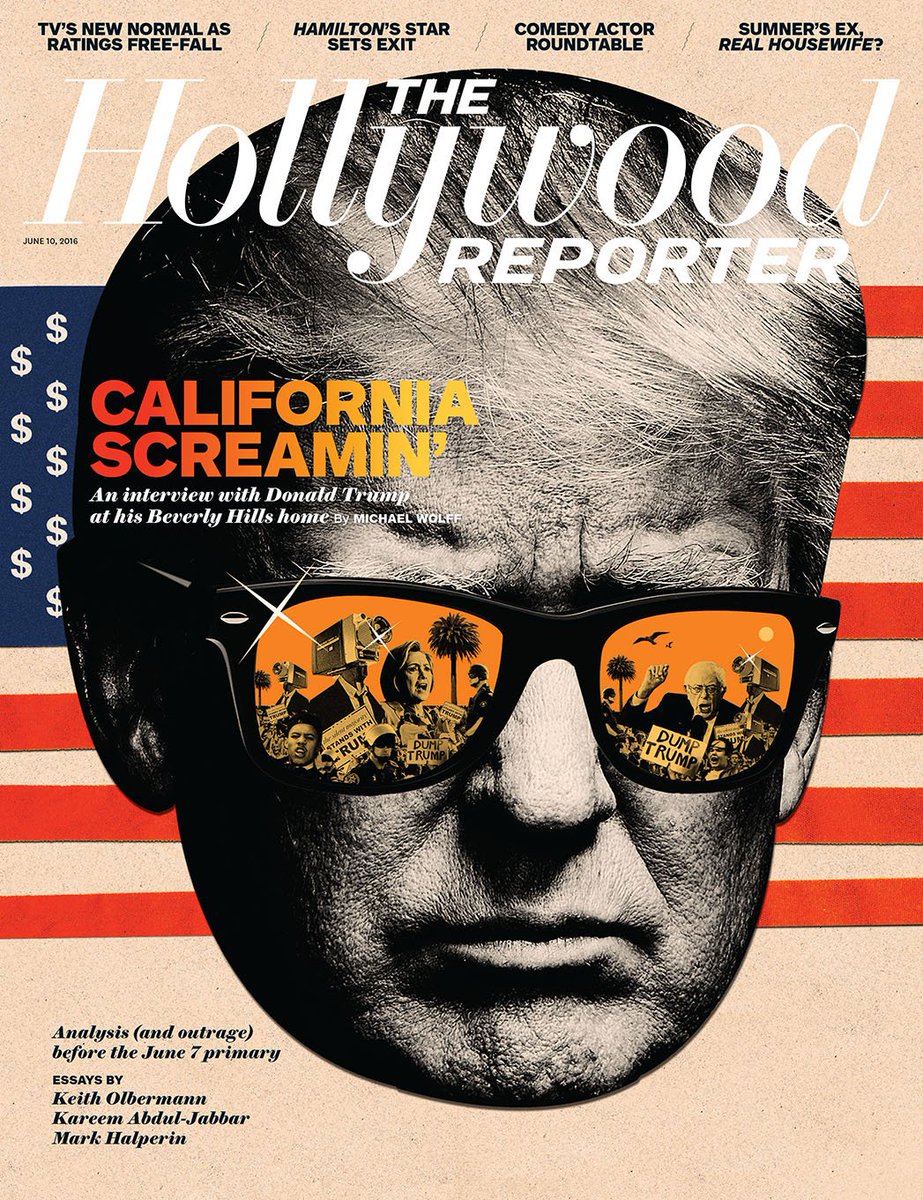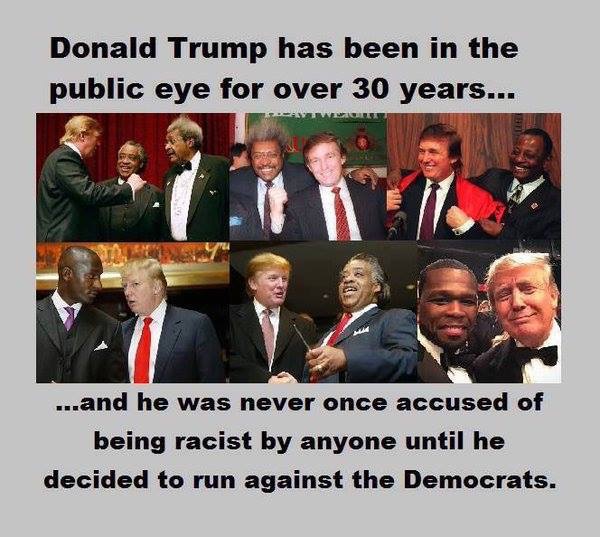Here is a good idea. Let's get rid of trade agreements we currently have, bring all of those jobs back to America, so some people can have jobs, while the prices for those goods rise during a tariff war, and the Wal Mart they shop at goes bankrupt. Great plan.
http://www.wsj.com/articles/donald-trump-lays-out-protectionist-views-in-trade-speech-1467145538
Donald Trump pledged Tuesday to withdraw the U.S. from global trade alliances, saying he would exit the North American Free Trade Agreement if it isn’t renegotiated, would label China a currency manipulator and would kill the Trans-Pacific Partnership, a Pacific Rim trade deal.
The presumptive Republican presidential nominee’s trade proposals amount to a wholesale rejection of longstanding Republican orthodoxy and leave the party with a candidate arguing against the very policies that most GOP leaders have enacted and supported. He spoke longingly about 18th century economic policy that funded the federal government largely on tariffs.
“Our original Constitution did not even have an income tax. Instead, it had tariffs—emphasizing taxation of foreign, not domestic, production,” Mr. Trump said. “Yet today, 240 years after the revolution, we have turned things completely upside-down.”
Within hours of Mr. Trump’s remarks in Pennsylvania, presumptive Democratic nominee Hillary Clinton offered a strikingly different economic view in an address on technology, saying she would aim to connect every U.S. home to high-speed internet and calling for expanding free Wi-Fi networks in public spaces. “We need to get back into the future business, because that’s who we are as Americans,” she said in Denver.
Mr. Trump’s speech drew condemnation from both Democrats allied with Mrs. Clinton and Republicans who have long sought to boost U.S. trade. The U.S. Chamber of Commerce spent much of Mr. Trump’s speech arguing against his views on its Twitter account, saying his approach would cost 3.5 million U.S. jobs and result in “higher prices” and “a weaker economy.”
Little of what Mr. Trump proposed came as a surprise to observers of the 2016 presidential campaign. From the beginning, the New Yorker has articulated nationalist policies on the economy, trade and immigration that have driven his appeal, particularly among working-class voters who have seen jobs disappear in an increasingly global economy.
Some of his most specific criticism Tuesday was aimed at China. “I am going to instruct my treasury secretary to label China a currency manipulator. Any country that devalues their currency in order to take advantage of the United States will be met with sharply,” he said.
Chinese officials regularly say they are letting markets play a bigger role in setting the yuan’s value against the dollar. The International Monetary Fund has argued that the yuan no longer is undervalued.
He also vowed “to instruct the U.S. trade representative to bring trade cases against China, both in this country and at the WTO. China’s unfair subsidy behavior is prohibited by the terms of its entrance to the WTO, and I intend to enforce those rules,” he said of the World Trade Organization.
Mr. Trump didn’t mention the most aggressive trade policies he touted during his primary campaign: a tariff of up to 45% on Chinese-made goods and stiff financial penalties on U.S. companies that move factory work to Mexico. But he did seek to tie his own brand of economic nationalism with the U.K.’s vote last week to leave the EU.
“Our friends in Britain recently voted to take back control of their economy, politics and borders,” Mr. Trump said. “I was on the right side of that issue as you know—with the people. I said it was going to happen, I felt it, while Hillary, as always, stood with the elites. Both she and President Obama predicted that one and many others totally wrong.”
Mr. Trump’s protectionist trade proposals put him closer ideologically to recent Democratic presidential candidates than to Republicans, who in 2012 placed enacting the Trans-Pacific Partnership in the official GOP platform. Both Barack Obama and Mrs. Clinton in 2008 said they would seek to renegotiate Nafta, though Mr. Obama didn’t follow through while in office.
Vermont Sen. Bernie Sanders, in his primary challenge of Mrs. Clinton, boasted that he had voted against Nafta and said he wasn’t comfortable with any recent U.S. trade agreement. Mr. Sanders said he would reject the TPP, and Mrs. Clinton eventually agreed with him.
Mr. Trump has previously lambasted Nafta, which was signed by Democratic President Bill Clinton but largely negotiated by his predecessor, Republican President George H.W. Bush.
“I’m going tell our Nafta partners that I intend to immediately renegotiate the terms of that agreement to get a better deal for our workers,” Mr. Trump said Tuesday, for the first time citing specific presidential authority to end the pact. “If they do not agree to a renegotiation, then I will submit notice…that America intends to withdraw from the deal.”
Mr. Obama is to meet with his Canadian and Mexican counterparts Wednesday in Ottawa at what has become known as the annual “Three Amigos” summit.
Without specifically addressing Mr. Trump’s trade speech, Mrs. Clinton, in her remarks, said her Republican opponent’s signature slogan to “make America great again” amounts to “code” for rolling back inclusive policies.
“Forget about technology, forget about inclusivity, forget about giving everybody an opportunity to have a real shot at the best possible future,” Mrs. Clinton said of Mr. Trump’s proposals. “Well, that is not who we are as Americans. We don’t go back—we go forward.”
Democrats sought to cast the businessman as a hypocrite who pays lip service to making products in the U.S. while outsourcing jobs in an effort to bolster his own bottom line. On her Twitter account,
Mrs. Clinton noted that Mr. Trump’s signature shirts are made in Bangladesh.
AFL-CIO President Richard Trumka, who leads the nation’s largest labor group, said Mr. Trump “embodies everything that is wrong with our current trade policies. He personally profited from Nafta.…And he has consistently sent American jobs overseas to line his own pockets.”
Mr. Trump cast doubt upon Mrs. Clinton’s own professed doubts about the TPP, which includes the U.S. and 11 other nations. He predicted she would “rush to embrace it” once in office.
“Ask Hillary Clinton if she is willing to withdraw from the TPP her first day in office and unconditionally rule out its passage in any form,” Mr. Trump said.
Jesse Ferguson, a Clinton campaign spokesman, pushed back against Mr. Trump’s assertion that the former secretary of state would support the Pacific trade pact if she were elected.
“Hillary Clinton opposes TPP today, she will oppose it in November, and she would not move it forward in January,” Mr. Ferguson said. “Hillary Clinton has made clear that she is not interested in tinkering around the margins with TPP. As she has said repeatedly, she believes we need a new approach to trade that protects American jobs, raises incomes for American workers, and strengthens our national security.”

